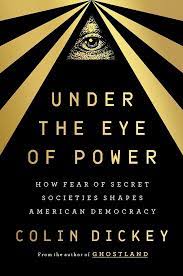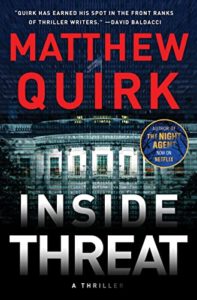It’s comforting to think of McCarthyism or the Salem Witch Trials as exceptions, as bursts of madness and vindictive cruelty in an otherwise sane country. But they’re not exceptions, they’re par for the course in the United States where fear of conspiratorial plots is the “great unseen engine of American history.” That’s the verdict of cultural historian Colin Dickey.
In a memorable, chilling phrase, the author of Under the Eye of Power throws down the gauntlet with the opening line of his new book: “The United States was born in paranoia.”
Dickey goes on to explain that there’s nothing hyperbolic about this statement. In briskly narrated and sometimes alarming chapters, what follows is a parade of secret, secretive, or “foreign” groups that have been seen as targeting America for a hostile takeover of one kind or another. All these groups have supposedly sought total control, and the unreasoned fear of their machinations has consistently created “moral panic.”
The culprits include real and quasi-imaginary groups: Freemasons, the French, Catholic immigrants, the Molly McGuires, Mystic-Red, Abolitionists, labor unionists, The Illuminati, slave owners, Jews, anarchists and socialists.
All of those groups have been viewed as malign, destructive, nefarious and subversive, deviously operating behind the scenes as puppet masters and saboteurs of American values and independence. And so there’s been a drumbeat of fear, outrage and violence throughout this country’s history going back to the time of the Revolution.
One of the many surprises in this ugly catalogue of craziness is the fact that even George Washington was prone to see the unseen hand of conspiracy behind contemporary events. Ditto Samuel Adams, as Stacy Schiff shows in her splendid biography of Samuel Adams–he thought that the English were definitely conspiring to “enslave” the colonists and deprive them of their liberties.
The author brings to our attention riots and massacres that deserve more attention, but does the second incarnation of KKK really belong here when it was so ostentatiously public in its racism and violence?
The book definitely needed a firmer editorial hand. Dickey keeps explaining in different ways that belief in secret groups with inordinate power supplies a simple explanation to complex and frightening realities. Yes, we got that the first time, and it’s not an especially original observation.
The author has a degree in comparative literature , so it’s curious that he doesn’t mention the influence of Matthew Gregory Lewis’s classic tale of priestly depravity The Monk when he discusses wild, anti-Catholic novels featuring depraved monks and nuns that were best-sellers in the 1840s.
The book is colorful and often shocking, but even at only 328 pages of text seems too long for its thesis. And given that Dickey ably pinpoints our continued forgetfulness about these episodes, his book will likely fade away too. ★★★
Lev Raphael is the author of twenty-seven books in genres from memoir to mystery and has seen his work appear in fifteen languages. He has reviewed books for The Washington Post, The Detroit Free Press and other publications.


